








Humber College gears up for Earth Month with a unique workshop, conducted to give back to the local feathered population.
The Humber Arboretum hosted a free Bird Box Making Workshop on March 25, which was led by student and community engagement specialist, Emelia Maceasik, and her team of ambassadors and ambassadors-in-training.
The purpose of the workshop was to teach the participants the importance of bird boxes for the environment and to increase the available habitat for nesting birds this spring.
The workshop began with participants of the Humber community being divided into three groups.
They were then given the necessary materials and instructions to build their bird boxes.
While the participants in each group used their ingenuity to build the boxes, Sarika Bhageratty, one of the ambassadors, provided expert context regarding which birds or species these boxes would attract.
“These bird boxes are specifically targeted to swallows, but eventually if the swallows leave, mammals will come in,” Bhageratty said. “But at the end of the day, it doesn’t really matter what animal’s there because it’s a safe home for them and that’s kind of why we’re doing it.”
The ambassadors-in-training also explained how different types of bird boxes were suitable for various bird species and where they would ideally placed to ensure maximum usage by birds.
After constructing the boxes, Maceasik and her team led everyone deeper into the trails of the Arboretum, eventually reaching the spot known as the Meadow Valley.
This is where the team began taking down the old bird boxes that were installed before the pandemic and were in dire need of replacement. Maceasik said bird boxes are typically replaced between one
and three years but it is essential to maintain them.
“Depending on the weather and other environmental conditions, these boxes can be changed either in one, two or three years,” she said. “As these ones are pretty solid and are brand new from a pre-fabricated kit, I think these can be replaced about two years from now.
“If you do own a bird box then it’s important to clean them once a season to make sure that no pathogens or other bacteria or fungi can spread between the species that inhabit the spots,” Maceasik said.
As the new bird boxes were being
put up meticulously, the team carefully checked the old bird boxes for any wildlife that may have taken refuge within them. Denver Fonseca, a participant and an event management student at Humber North, said he was thrilled about the event as a whole.
“Making the actual box was a bit tricky but it was a lot of fun. I wish I could participate weekly, bi-weekly or even monthly in events such as this,” he said.
Maceasik said she and her team will continue to engage different groups in the community and, for the next event, they intend to invite Rexdale residents.
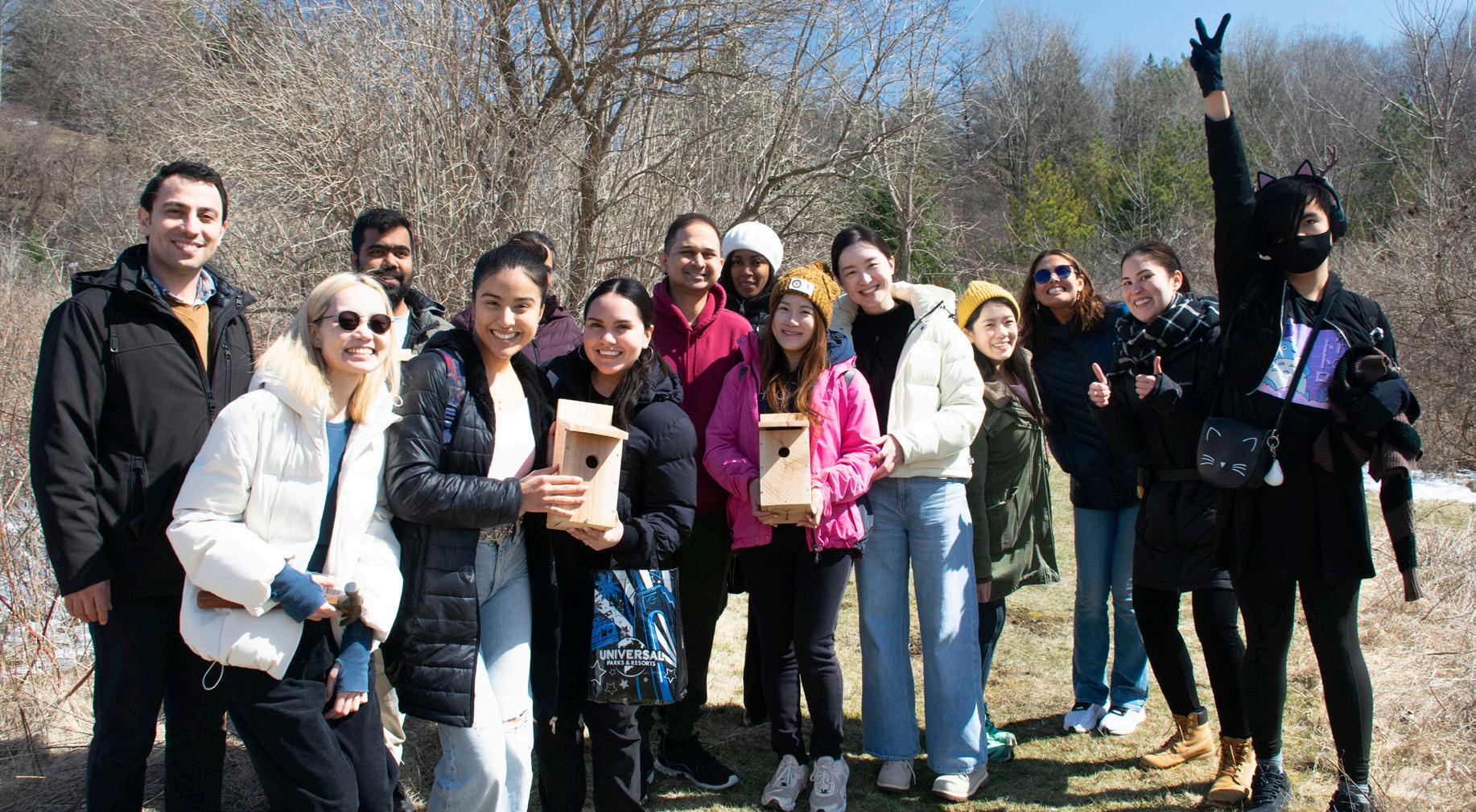
Humber Et Cetera is the Humber College journalism program laboratory newspaper. It is created by journalism students in the Advanced Diploma and Post Graduate Certificate programs. Et Cetera serves to inform the Humber community and give its readers well rounded coverage on the things that matter to them.
EDITOR-IN-CHIEF
Zoe Pierson
PAGE 1 EDITOR
Liv Chug
NEWS
Ankur Gupta
Etti Bali POLITICS
Brandon Harris CULTURE
Aarjavee Raaj
Iqbal Alibhai
SPORTS
Caleb Moody
Toni Canyameras
OP-ED
Adrian Olivier
FACULTY ADVISER
TECHNICAL ADVISER
Ishmeet Singh


All-Canadian Erika Dodd is one of the leaders on the dominant Humber women’s volleyball team.
Despite the amazing highs of winning an Ontario College Athletic Association (OCAA) championship this season, Dodd also faced very significant lows.
During the playoffs, she hurt her ACL and needed surgery, which kept her out of the Canadian College Athletic Association (CCAA) playoffs. But despite being held off the court, as a leader on the team, she still contributed off the court. As a veteran player, Dodd was able to coach her teammates through the hardest times in the playoffs, which was a difficult transition to make. “At the beginning, it was very difficult to sit on the side and watch my team play,” Dodd said.
She said the nationals were a tough time for the team, but she was able to support her teammates through it all because she’d been in that position before. She had to get used to not playing but was able to support her teammates with advice.
“I kind of accepted the fact that I was out and tried to support my team the best I could from the sidelines, giving them anything that I could see or just kind of being someone they can lean on from being in those moments as well,” Dodd said. She said she will work over the summer with the team as they try to get back to nationals once again.
This report is by David Lynch, Sports Reporter.
Immigration Minister Marc Miller, announced last Thursday the federal government would cap the number of temporary workers coming to Canada till 2027.
The minister said Canada will decrease the amount of temporary workers in Canada to five per cent from the current 6.5 per cent of Canada’s population.
Miller in his March 21, 2024 speech, said “programs that welcome temporary residents must reflect the needs and changing demands of the labour market.”
“Our labour market needs are tightening, so should our policies,” he said. “As we gradually reduce our reliance on temporary foreign workers, we will continue to help employers fill job vacancies while supporting Canadian workers.”
An international student at Humber College, Shane Cunanan said she believed employment should be based on merit, not citizenship or residency.
“They should get [the job] that fits with their educational background or their experiences,” she said.
The Temporary Foreign Worker (TFW) program says a temporary
worker is a foreign employee hired to fill jobs for a set period which cannot be filled by Canadian residents or immigrants.
Statistics Canada said in May 2023 there were 70,000 temporary workers in 2022, a rise of 15.4 per cent from 2021.
As of March 2022, there were more higher-wage temporary workers than lower-wage workers, Stat Canada said.
Higher-income workers include skilled workers within the agriculture, academic and caregiver streams, StatCan said.
Randy Boissonnault, minister of employment, said Canada intends to further reduce its reliance on foreign workers and find employees among the Canadian labour force.
“The time-limited measures we introduced in 2022 were necessary as our labour market was facing unprecedented conditions,” Boissonnault said. “But now, as times change, we must ensure our Temporary Foreign Worker (TFW) Program reflects our current needs.” Canada’s 2022 budget was committed to transitioning away from TFWs and developing a new foreign labour program. The budget was meant to ensure

food producers have sufficient labour while transitioning to increased employment of Canadian citizens and permanent residents.
The budget outlined improvements to the TFW program including the collaboration between Canada and the nations exporting their labour.
It said the improvements would build a more robust system that would increase protections for temporary worker rights.
The current TFW program asks employers to submit an application called a Labour Market Impact
The LMIA is a form that employers fill out to describe their needs and the lack of Canadian applicants applying for temporary positions.
Neither the Progressive Conservatives nor the New Democratic Party have made a statement about the cap and its implications. Legal Aid Ontario (LAO), which provides representation for refugee and immigration cases and questions among other services, told Humber News in an email that “the recently announced measure won’t affect LAO much.”
Humber’s Public Safety Department is asking for help with finding a male suspect following an incident that happened in a women’s washroom at North Campus last week.
According to a security alert, it took place inside a second floor washroom in the K building on March 20 around 3:45 p.m.
The Director of Public Safety, Rob Kilfoyle, said it’s important for students to be aware of when events like this happen.
“We want to be very vigilant, and we’re trying to locate the individual,” Kilfoyle said. “It’s been our experience that these kinds of complaints aren’t just a one-time thing.”
The suspect is described as a male, approximately 5’8”, medium build, approximately 19-20 years of age, stubble facial hair, curly hair and wearing a black jacket with a hood and carrying a backpack.
According to Humber’s Public Safety department, they only get reports about incidents taking place in the washrooms about once a year. “We put out the secu-

rity alerts and we want people to be aware of the fact that the incident occurred and we are monitoring through security patrol and we have cameras up in some areas that we can monitor for the description,” he said.
Annabelle Berry, a first-year student in Humber’s paralegal program, says that hearing about what happened in the washroom has made her more cautious around campus.
“I always felt pretty safe, but hearing about the bathrooms makes me feel a lot more cautious
about who’s around me sometimes because you never really know someone’s intentions,” Berry said. Since finding out about the incident, she says she’s hanging out with others more.
“I either ask my classmates or coworkers if they want to come with me, so I’m at less of a risk of being stuck in a situation alone,” she said.
While Kilfoyle said the odds of being targeted by this individual are small it’s still good to take precautions whenever necessary. Kilfoyle is also encouraging stu-
dents to use the Humber Guardian app, which can be downloaded for free on their phones. It allows students to directly contact the Public Safety Department without having to memorize or search for the phone number.
Anyone with information about the individual involved in the incident in the washroom is encouraged to contact either Public Safety at 416-675-8500, call Toronto Police Service at 416-808-2204 or anonymously contact Crime Stoppers are 416-222-TIPS (8477) or online at www.22tips.com.
Days after the city approved new rules for dangerous dogs, Toronto police have arrested a woman they say was responsible for a dog attack on a child over the weekend.
The attack occurred at 10:15 a.m. on March 23, when a father and his child entered the Little Norway Park, police said.
Police have identified the woman, arrested on March 25, as Patrycja Siarek, a 38-year-old resident of Toronto. A sign on the park fence reads that no dogs are allowed.
Police said Siarek’s dog, already in the park playground and offleash, charged toward the child through an open gate. The dog then bit and dragged the child to the ground. The dog, which police said caused the child “serious, life-altering” injuries, has been seized by Toronto Animal Services.
Police have charged Siarek with five separate offences, including criminal negligence which caused bodily harm and failing to prevent her dog from biting or attacking.
Other charges include allowing

her dog to run at large in a public area and failing to muzzle her dangerous dog. Last month, a woman was attacked by two dogs in the Martin Grove Road and John Garland Boulevard area.
In an emailed statement, Director of Animal Services for the City of Toronto Dr. Esther Attard, strongly urged all dog owners to
keep their dogs on leashes when out in public.
Attard said there had been a rise in dog attacks in 2023, with 2,726 service requests registered for potentially dangerous acts by dogs, up from 2,653 in 2022.
Last week, following the rise in dog attacks, the city approved the creation of a public list of dan-
gerous dogs which will list the first three digits of the dog owner’s postal code, ward number and the date of the dangerous act.
Jonathan Zacharias, a Toronto-based part-time dog trainer of nine years and a dog owner said that these attacks can be prevented.
“These are preventable attacks. You know, dog attacks do not need
to happen. It’s not a dog’s nature to hurt people,” Zacharias said.
“I am of the mind that there are no bad dogs, nor are there untrainable dogs, just poorly managed or trained dogs,” he said.
The most common reason a dog would attack anyone comes from reactivity, a term with dogs that means “they have a very visceral reaction when they see certain things,” Zacharias said.
Toronto’s Animals Bylaw requires dogs must always be kept on a leash while in public, except in designated off-leash areas in parks, and under the control of their owner.
Under the Bylaw, dog owners are responsible for their dogs’ actions and must take precautions to prevent their dogs from engaging in dangerous acts, which include any bite, attack or act of menacing behaviour.
“Most dog attacks could have been prevented if dogs are on leash,” Attard said. The city has designated dogs off-leash areas. Keeping dogs on leashes “protects everyone in the community,” she said.
More than 400 Bell employees were put on mute and laid off in a virtual meeting, on March 20, 2024.
The employees belonged to telecommunications in the Bell Clerical Bargaining Unit, who were declared ‘surplus’ with only a few entitled to a retirement incentive, as per a press release by Unifor, the union representing Bell employees
Previously, when Bell laid off nine per cent of its workforce on Feb. 8, 2024, Mirko Bibic, president and chief executive officer of Bell Canada Enterprises (BCE) Inc. and of Bell Canada, said they had assured fair treatment to the workers affected in his open letter.
“Please know we will support each person affected, including fair severance packages along with career transition services and continued access to our health benefits,” Bibic said. Unifor, the union representing 19,000 workers at Bell said, Bell’s Human Resources and Labour Relations Manager, Christopher Corsi, held a 10-minute meeting without allowing anybody to unmute and ask questions.
Unifor National President Lana Payne said Bell tried increasing its dividend payout without proper
planning.
“The truth is Bell picked a number of heads to roll so it could increase its dividend payout without an actual plan on which jobs and which workers would be eliminated so the terminations are cruelly dragged out,” she said.
Unifor National Secretary-Treasurer Len Poirier said Bell’s priority is to pay shareholders before its employees. “Our dedicated, loyal, workers, who are predominately women, will have to explain to their families tonight that they are
being let go from Bell for no good reason other than making sure that their shareholders and Board of Directors come first when getting paid,” he said. “It’s absolutely disgusting.”
Unifor said that Bell will now onwards allow union representatives and group call members to unmute themselves in all future meetings.
According to the press release, the employees were let go one day after Unifor rallied in Ottawa to call out BCE for terminating
thousands of employees in the past despite making profits and increasing dividend payouts.
In response to BCE terminating nine per cent of its employees, Unifor launched its “Shame on Bell” campaign on March 7, 2024.
According to a report by Unifor, BSE released more than 6,000 people in the last eight months despite paying out an all-time high $3.7 billion in dividends to shareholders. Dharampreet Singh Khaira, a human resources specialist at Adecco Canada, told

Humber News there are legal and ethical implications surrounding Bell terminating its workforce over a virtual meet.
“There are two things that an employer needs to take care of under the Employment Standards Act, they have to provide at least two weeks of written notice to their employees that their job would be terminated or if they can’t give that much period, they will have to give them the severance pay for two weeks,” he said.
“It is legal if they’re firing through a virtual meet because there is a notice and they’re communicating it,” Khaira said. “It’s legal, but you know it’s not ethically correct.” He said he does not believe this is good business and is bad for their brand image.
“Hiring and firing should be a two-way conversation, not a one-way conversation, like ethically speaking, like if we’re doing things the right way,” he said.
Khaira said companies like Bell prioritize shareholders over their workers.
“As much as we’d like to believe that companies have a responsibility to their employees, their undying loyalty is towards their shareholders because those are the owners of the company,” he said.
Second-year students from the Humber Recreation and Leisure Service program took over the LRC to raise money for future program scholarships.
This year’s Hunger Gamesthemed event, called ‘Humber Games’, saw students participating in activities like Jenga, Corn-hole, Connect 4, cup stacking, and a Hunger Games quiz to earn prizes.
This was all part of a summative assignment for student AJ Sousa and his entire class.
They were tasked with coming together to hold an event and work through the different aspects to make the event successful.
Sousa said the initial stages were the hardest part.
“Our biggest challenge was deciding and coming to a decision with so many people,” he said.
“The big reason was too many hands in the pot because our entire class had a huge discussion about what we should do for the theme.”
The fundraising goal they set
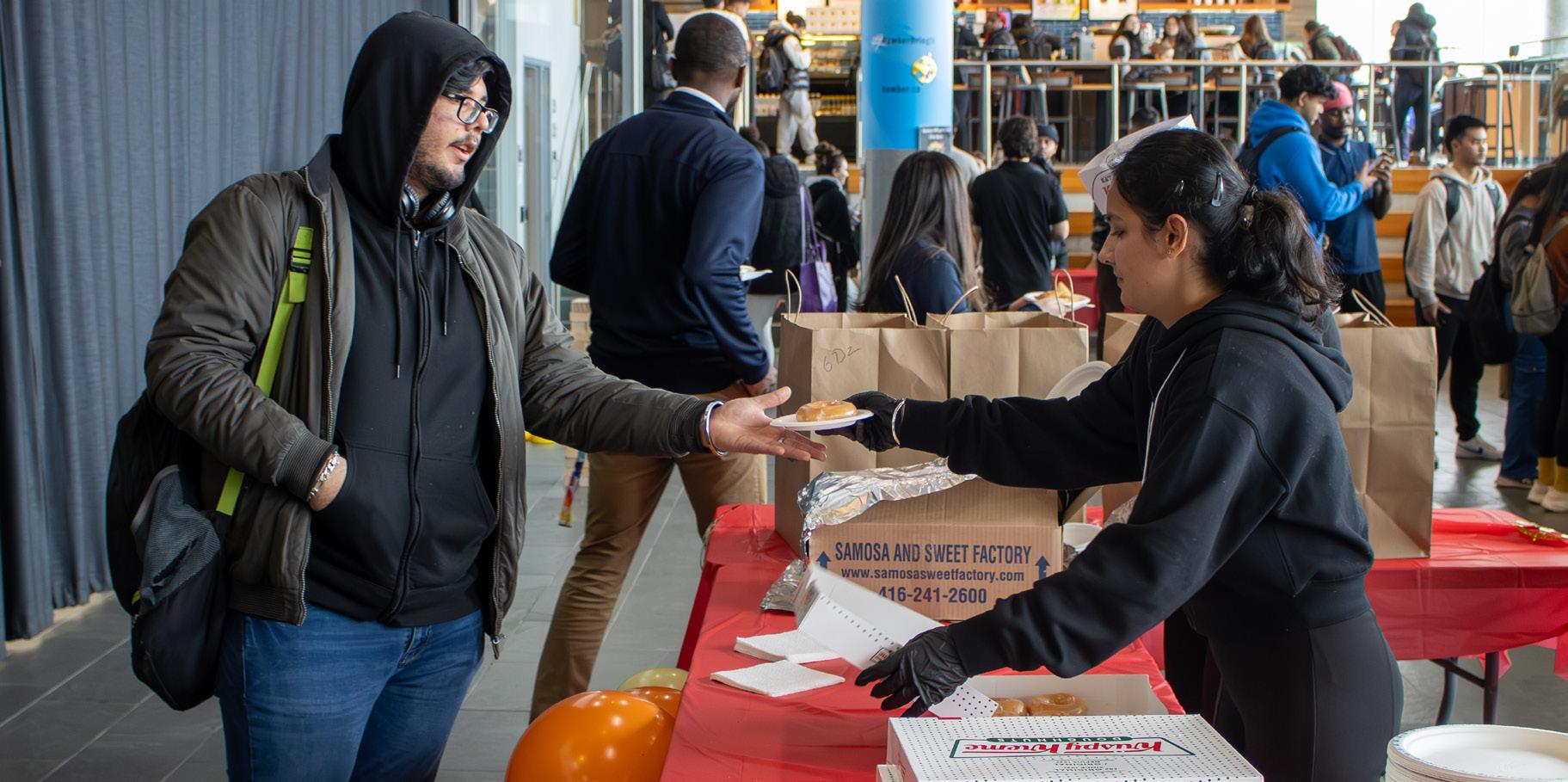
for this year is two thousand dollars, and he feels like they can surpass it.
The fundraising starts before entering the games. Students are asked to make a donation and with that they are promised a corresponding prize after all the games are played, the bigger the donation, the better the prize.
It is an opportunity for the students to execute a project from start to finish. They learn how to budget, how to market, how to
rent space, how to recruit people, and how to come up with ideas that are going to be enticing for people to attend.
They also learned about sponsorship, and how important it is in event planning.
This year they were able to sell Krispy Kreme doughnuts and give away prizes that were donated by sponsors like the Town of Caledon and the City of Mississauga through outreach.
One of the sponsors, Wil
McLean, owner and creator of Pursuit OCR and Rollerpony, said being just a small part of the event is special.
“Every year they try to raise a minimum of a thousand dollars, which covers two scholarships,” he said.
“Last year, from what I understand, it was four scholarships that they managed to raise money for.”
McLean is not a stranger to these Humber students, he is part
of some of the faculty programs where he appears as a guest and does shark tank-type events and then also mentors the students as well.
Program Coordinator Ashwin Patel said participating in these types of events helps students prepare for the future.
“Once they get into the rec and leisure industry, these are the things that some of them are going to be doing on a day-to-day basis and by doing it here they get an opportunity to do it in a safe space,” he said.
“I always get kinda emotional and excited about seeing them be able to do these things and I think recognizing that the limits that they put on themselves can be raised, that they can do even more than they previously thought that they can.”
Sousa is grateful he gets to not only participate in planning the event, but also has an impact on someone who is going to be in his shoes in the future.
“However much money we raise today our profit is going towards a scholarship for the 2025 graduating class of Rec and Leisure students.”
Immigration, Refugees and Citizenship Canada (IRCC) has amended the eligibility date for post-graduation work permits (PGWP) to May 15, 2024.
International students pursuing education at public-private colleges in Canada after May 15 will not be eligible to apply for a post-graduation work permit.
The IRCC had earlier announced international students graduating from colleges under such setups would not be eligible for PGWP as of Sept. 1, 2024.
The change in PGWP eligibility criteria does not have any impact on public colleges like Humber.
IRCC amended their decision on March 22, 2024.
Every international student who wants to work in Canada after completing their studies needs to have a PGWP, the IRCC said.
But just completing studies from any college does not make one eligible for PGWP. They need to graduate from a designated learning institution, IRCC said.
“This means that international students who begin this type of program on May 15, 2024, or later
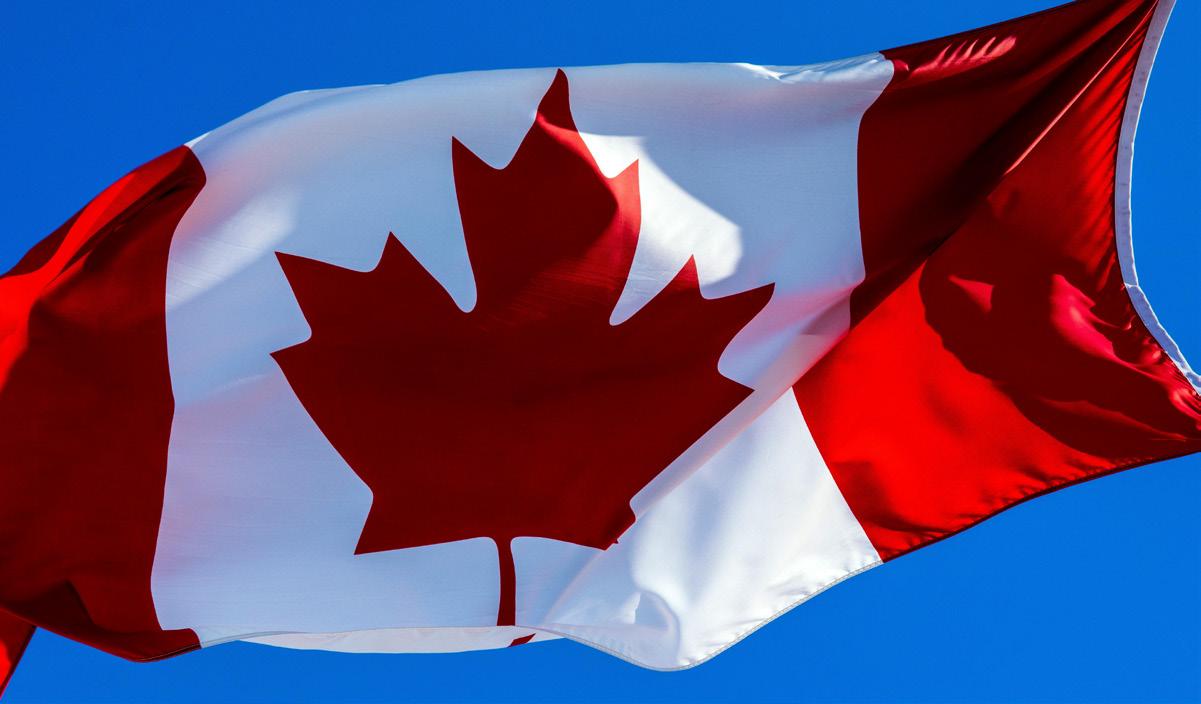
will not be eligible for a post-graduation work permit when they graduate,” it said.
“You may be eligible for a post-graduation work permit (PGWP) if you graduated from a designated learning institution (DLI) and want to stay in Canada temporarily to work,” IRCC said.
IRCC said that students completing studies from a DLI do not qualify for a PGWP. There are certain schools which have eligible programs.
Shubham Khanna, an Indiabased visa agent, said the colleges that were mentioned in the list, where students would not be eli-
gible to get PGWP, had changed their intake to a month earlier.
“You know when this announcement was made, we got notified that these colleges changed their September intake to August so that students will still be eligible for PGWP and take admissions in their college,” he said.
Public-private curriculum licencing agreements allowed students to obtain degrees from private colleges, delivering programs curated by public universities.
As a result of this, graduates were eligible for the PGWP because programs were from public universities.
A statement issued by IRCC said the decision does not prevent international students from being eligible for any other kind of work permit.
“For occupations that face a labour shortage in Canada, a graduate could apply for a work permit supported by an employer’s approved labour market impact assessment, for example,” IRCC said.
Simranjeet Kaur, an international student from India who enrolled in Loyalist College for the May intake, said she has some fears due to amendments made in the PGWP program.
She said these changes will make things a bit hard for her.
“I am anxious about the challenges that lie ahead as an international student as this change adds an extra layer of complexity to my academic and career planning,” Kaur said.
She said she is still filled with hope and is positive about the opportunities that are in store for her.
“I know there are challenges that lie ahead as an international student, but I am also positive about possibilities,” she said.
IRCC said it would limit the ability of graduates to qualify for work permits.
“Concerns have been raised with regard to the quality of education provided by these institutions, as well as the lack of sufficient student supports,”IRCC said in a statement on Feb. 5, 2024.
“It has made a change to restrict PGWPs for these institutions, anticipating that without the ability to apply for a PGWP, there will be a reduction in the number of international students enrolling in them,” IRCC said in the statement.
While current students enrolled in the colleges mentioned by IRCC will remain eligible for PGWP, the statement said new enrollees will not qualify for a PGWP.

Ontario announced it is seeking contracts for the next phase of Eglinton Crosstown West Extension (ECWE) development.
Transportation Minister Prabhmeet Sarkaria said the province has issued a Request for Qualifications (RFQ) to design and build seven new stations along the extension at a press conference on Monday.
“This contract will cover the design and construction of all seven stations along the line including architectural, structural, mechanical and electrical work,” Sarkaria said.
The 9.2 km extension will run from the yet-to-open Mount Dennis LRT station to Renforth Drive and will mostly run underground, according to the Metrolinx official website.
This stretch is a westward extension of the original Eglinton Crosstown LRT, which has been in development for more than a decade and remains unopened.
“Once complete, the ECWE will create a rapid transit line from the east end of Toronto through the heart of the city and into Mississauga,” Sarkaria said. He said that the LRT extension

is expected to be used by around 70,000 commuters every day.
“ECWE will help save commuters up to 24 minutes a trip,” Sarkaria said.
Sarkaria said the government had learned from their previous projects as construction time and costs continue to exceed previous estimates.
“We’ve got shovels in the ground for this project already and have completed five kilometres of tunnelling,” he said.
Sarkaria said the government had adopted new procurement measures for these projects and is planning to spend $70 billion over
the next 10 years on transportation.
Executive Director of CodeRedTO, a transit advocacy group, Cameron MacLeod said the positive aspect of the extension’s progress is infrastructure is being built faster than before.
“We are getting closer to ongoing network improvements, potentially creating a virtuous cycle of learning and improving on contract structures, funding models, and construction schedules,” McLeod said.
He said while this will bring rapid transit to central Etobicoke, keeping the Extension fully
grade-separated would mean fewer stations, higher costs, and less than-promised accessibility.
“It’s important for the public and our leaders to know the result when they make choices that prioritize protecting private car space,” McLeod said.
An Etobicoke resident, Devesh Sangu, said he is eager for the extension to open.
“I travel from Etobicoke to Downtown for work. It takes me two hours to commute from one side. I’m doing four hours of travelling every day,” Sangu said.
He said the extension would save him precious time and money,
provided it opens soon.
“I’ve been seeing endless construction and news about the LRT for the longest time. When it opens, I’d be saving a lot,” Sangu said.
At the press conference, Metrolinx CEO Phil Verster said that all major construction on the 25-station Eglinton Crosstown LRT was completed.
The Eglinton LRT would run along Kennedy in the east to Mount Dennis in the West, according to the official Metrolinx route map.
The 19-kilometre line has been under construction since 2011 and does not have an opening date yet.
Verster said there were software defects in the signalling and train control system that were causing them to slow down.
“Release 6 of the software has started to be tested; it will fix some of the defects but release 7 is already planned for June,” Verster said.
Toronto Mayor Olivia Chow was also present at the conference. She said the LRT project would help get car congestion off the road.
“[With the LRT] thousands of Torontonians are going to benefit,” Chow said.
The Ontario government is pushing through slow economic growth with the highest budget the province has ever seen.
Ontario Minister of Finance Peter Bethlenfalvy released the $214 billion provincial budget on March 27 at Queens Park.
In the face of high-interest rates and economic uncertainty, Bethlenfalvy said the province would continue to invest money into Ontario while keeping costs low for families and businesses.
“While economic growth is expected to significantly slow in the coming year, private sector forecasters are cautiously optimistic that it will not drop into negative territory before rebounding in subsequent years,” he said.
Instead of raising taxes or cutting investments to cover provincial debt, the government plans to move forward with their plans and wait for the future return on investments, Bethlenfalvy said.
The Ontario budget forecasts a $9.8 billion deficit for the 20242025 year, compared to $3 billion in 2023-2024.

This contrasts the 2023 budget which predicted a $200 million surplus by 2024-2025, according to Ontario’s website.
Bonnie Crombie, the Ontario Liberal Party leader, said the provincial government’s budget is a “do-nothing budget” and does not help the people who need it the most.
“The Minister concedes economic growth is down and the debt deficit is up, but he does nothing to help families and local businesses who are struggling,” Crombie said in a press release.
Official Opposition NDP leader Marit Stiles also said Ford’s budget did not do enough to help Ontarians.
“People are looking for better health care and homes they can afford,” Stiles said in a press release. “Instead, they got an uninspired statement from a government that is out of touch and out of ideas.”
She said the government had an opportunity to help Ontarians but decided to use policies that continue to fail.
Ontario resident Dave Campanella said the lack of change in the budget is not surprising to him, but he likes to see the government investing more in Ontario.
“I like where they’re putting some of the money. I think it’s the right thing to do,” Campanella said. “But we don’t have a choice but to deal with it.”
According to the budget, the government is committing more than $190 billion in the next 10 years to develop housing, transit, highway expansions and other infrastructure supporting economic growth.
Another key element in the budget is to continue putting money into the pockets of Ontario residents by cutting taxes, instilling policies such as One Fare, and continuing to freeze tuition for post-secondary education.
The budget forecasts a surplus of $500 million by 2026-2027 by investing in Ontario’s future instead of worrying about today, Bethlenfalvy said.
“There is a light at the end of the tunnel, we can see it,” he said. “With that said, we are not out of the tunnel quite yet.”
The encampment at St. Stephen-InThe-Fields church was a “safe haven” according to its Reverend, Maggie Helwig.
On Nov. 24, 2023, the City of Toronto cleared the encampment which had been there since the spring of 2022.
A large mechanical claw removed the tents and the city disposed of any belongings that remained. Several residents were displaced, some accepting shelter accommodations and others moving to nearby encampments.
In the days and weeks following, the city installed large concrete blocks and fences on the property.
Despite these efforts, the encampment remains, supported in large part by St. Stephen-In-The-Fields Church and its Reverend, Maggie Helwig.
Humber News spoke with Helwig about life at the encampment since that November clearing.
Q: What’s happening there today?
A: Everybody talks about the eviction in November. It was never a complete eviction.
It was an attempted eviction, but it was never fully successful.
Half of the churchyard is fenced off and has concrete blocks, but the other half, as well as the small area that’s actually church property, people have continued to live in those areas. So there was never a point when the encampment wasn’t there.
Despite attempts to evict the encampment, it has continued to exist there.
Q: When the concrete blocks were installed, there were conversations about whether it was even following city code
A: They put concrete blocks on everything, immediately everyone started calling the city about the trees and compressing the roots of the trees and how you can’t put concrete blocks that close to trees.
So they came back the next day and they took away some of the concrete blocks around one tree and left the other tree because they thought that it was burnt and it was dead.
We now have a weird kind of Minecraft game in our front yard with blocks and gaps.
And then people throw garbage over the fence, of course, because college is a main street and there’s lots of students and people and garbage gets thrown over the fence and it just builds up in there because we can’t get in there to clean up garbage.
Q: Garbage is a bit of a theme, right?
Can you tell me about what the city was saying about garbage cleanup?
A: The city’s position is that city staff cannot clean up garbage themselves from the encampment because of the danger of needles.

So their position is that city staff will only take what is put in a bin.
We have found it very difficult to coordinate having our people there to get stuff into bins at the right time for the city pickup because they come on a very fixed and early schedule.
It’s been a challenge. We’ve ended up getting the blame for fire risk, although we are trying.
Acouple of weeks ago, we actually spent nearly $4,000 from the church budget to have a large quantity of garbage fall away because of the impossibility of coordinating with city vehicles to get a large quantity of garbage removed.
Meetings with the city ended after the attempted eviction and I no longer have channels of communication with anyone except the fire captain.
We feed 500 people a week and we’re already in deficit to try to get things cleaned out.
A few days after that, the city arrived for a cleanup, which they had not told us about, found that everything was essentially already cleaned up and I guess to make themselves feel like they had something to do, grabbed all the blankets and tarps that people had spread on the fence to
tion and now he’s back in a tent.
So that tends to be how shelter hotels where people don’t stay there long.
Q: Why does the church support the encampment?
A: The church is here to be a safe and supportive space for people who need that.
The church traditionally all through its history has been a place of sanctuary.
This church in specific has always dedicated itself to trying to be there for the community, whatever that meant, whatever community needs present themselves to us. We try to be there, we try to support that, we try to provide safety and support as best we can.
Q: What should the city be doing to support both the church and the residents of the encampments?
A: Short term, accept that people are living in encampments because that is their best option and provide them with what they need to live there more safely and more comfortably.
Provide fire extinguishers, provide fire retardant tents, provide safer ways of keeping warm in the winter, provide more insulated sleeping bags, more insulated clothing, hand warmers, foot warmers, you know, whatever technology is available to help people stay warm more safely.
Provide more bathroom facilities, more needle disposal facilities and more harm reduction supplies.
Just accept in the short term that this is, in fact, the best solution people have been able to find and help make it better.
dry. So people lost a bunch of blankets and tarps that they were trying to dry out in the outlet. Yeah. So it’s very poorly coordinated right now.
It’s a weird situation. It’s like the city’s sort of trying to pretend that the encampment isn’t there, but they can’t completely do that, and they don’t want to talk to me, but if they don’t talk to me, we can’t coordinate.
Q: What is the encampment like right now? Can you tell me a bit about the residents and what they’re going through?
A: The attempt to evict was extremely traumatic and destabilizing. I think we saw the remaining residents, almost all go into a bad emotional spiral after that event. Some of them are no longer there.
We don’t know where one of them has gone. Actually, we’re a little concerned because we’re not sure where he is.
The other has moved to a different encampment. Two of the long-time people are still there. They’re a little on edge because they never know what’s coming day to day. But they’re still there.
One of the people who’s living on site is actually one of the people who went into a shelter hotel the day of the attempted evic-
In the long term, they have to think more creatively about what kinds of shelter and housing solutions are going to create the community of mutual support that people have in an encampment.
Because shelters and housing treat people as atomized individuals, and people don’t live as atomized individuals, people live as a community.
People have found community in encampments, and that’s part of the appeal. We need to build more of that into our thinking about shelter and housing options. How do we create options that allow people to have that sense of community that they might have in an encampment, but in an indoor, heated, dignified, proper accommodation?

The focus on data in Canadian health care often obscures the individuals behind it. Large corporations and political parties often overlook the human aspect of the data.
Canadian healthcare, for many, is not free.
The College of Family Physicians said the Canadian healthcare system lacks when it comes to supporting Canadians and employees alike.
“More than six million people in this country don’t have access to a regular family doctor. Family physicians themselves are overwhelmed, burnt out and suffocating under administrative tasks. Many are leaving the profession,” the college said.
Our nation is in a health-care crisis, and it seems it will only be getting worse.
Statistics Canada reported that there will be an increasing need for health-care support and response from the Canadian system.
“The aging population, rising rates of chronic disease and other changing health trends have emphasized the need for the health care system to maintain and continue to develop the capacity to respond to the changing needs of Canadians,” Statistics Canada reported.
Healthcare planning and decisions have not been made for the benefit of Canadians, but rather with politics and large corporations in mind. We are failing our citizens by refusing to offer monetary support where it is most needed.
Statistics Canada reported that on average,

total health expenditures paid to hospitals and physicians declined while spending on drugs has greatly increased.
This is not what Canadians need. Canadians need a health care system focused on patient care rather than medications.
Jeff Nicholls, founder of Minden Paper, a research-focused health care advocacy group, along with his team, is committed to studying, understanding and uncovering the inner workings of Canadian public health institutions.
“It really does seem like health care planning and provision decisions are being made not really on the basis of evidence, not really on the basis of anything related to patient outcome,” Nicholls said.
“Unlike any time before, the level of political involvement in health care planning and provision has become a bit outrageous,” he said.
Ontario is currently facing a health-care worker shortage, greatly affecting patient care. Workers are deterred from working by
the long hours, gruelling shifts and the overfilling of patient beds.
On April 1, nurses will be given a three per cent raise, once again, to support filling open positions in hospitals in Ontario, an official release from the Ontario Nursing Association (ONA) and Participating Hospitals said.
The official release from the agreement reported there must be an increase in wages to promote a positive and smooth work environment.
“ONA members are leaving their jobs because vacancies were not being filled, creating unmanageable workloads leading to burnout and exhaustion driving employees from the workplace,” the statement said.
The report said Ontario hospitals were pushed beyond capacity in the face of the pandemic.
“While capacity has increased, new beds were added when the pandemic began and more than 3,000 additional beds were announced in 2022 with 1,700 of those already up and running,” the report said.
Ontario filled beds without properly preparing their nursing and health-care staff. Growth in intake meant a loss of health-care workers and the effectiveness of the healthcare environment.
The health care system is not simply failing because of our governments. A combination of lack of financial and beneficial support from provincial and territorial governments, along with our inability to properly staff and offer beneficial care to those who need it most.
Artificial Intelligence (AI) is evolving so rapidly that governments need to proactively anticipate future problems and capabilities of AI.
RBC’s 2024 Fraud Prevention Month poll suggested that 88 per cent of people in Canada agree that scams with the use of AI will increase this year.
This makes it necessary for the government to stay a step ahead and stop these AI scammers, by bringing in strict regulations in place.
Competition Bureau Canada, an independent law enforcement agency, in a recent news release, said sometimes it is hard to tell what is real and what is AI-generated.
“AI can be used to quickly produce texts, emails and messages in the style and language of a specific person. It can be used to clone anyone’s voice. And in just minutes, it can be used to make fake images, audio, or videos of real people,” the statement said.
With all this happening at such a fast pace, Canada currently has no regulatory framework in place that is specific to AI.
Canada’s Artificial Intelligence and Data Act (AIDA) which is a part of Bill C-27 was tabled in June 2022, even before ChatGPT

launched.
The bill is currently in consideration at the Standing Committee on Industry and Technology in the House of Commons and would come into force no sooner than 2025.
It could take years for the government to pass a bill so government needs to be planning for future advancements.
The government introduced a Voluntary Code of Conduct on the Responsible Development and Management of Advanced
The voluntary nature means it’s unlikely to be effective.
Canada’s Minister of Innovation, Science and Industry, François-Philippe Champagne, met with his G7 counterparts in Italy from March 13 to 15 to discuss innovation, governance and responsible use of emerging technologies.
“Canada is a world leader when it comes
to the governance and responsible use of AI and other emerging technologies,” Champagne said.
However, Michelle Rempel Garner, Conservative Party MP in her speech during the House of Commons debate on Bill-27, said the Liberal government unveiled the bill six months before the release of ChatGPT, rendering the approach this bill proposes obsolete.
“Since AIDA was initially tabled, a generation’s worth of technological change and impact has occurred, both positive and negative,” she said.
“AIDA needs to be shelved, and Canada’s approach to developing and regulating AI urgently rethought, in public, with industry and civil society input,” Garner said.
Garner is right. It doesn’t make sense to implement a Bill that is no longer up to date.
The EU AI Act was passed on March 13, which claims to be the first comprehensive regulation of AI by a major regulator anywhere.
With the pace at which AI is progressing, Canada urgently needs to enact regulations which can accommodate the future progress of AI.
 Liv Chug Page 1 Editor
Liv Chug Page 1 Editor
Accessibility is a priority at Humber, but accessing gender-neutral washrooms is trickier than ever due to a lack of understandable signs and terminology.
As someone who prefers to use a gender-neutral washroom, using one can easily become a stressful experience.
This is largely due to how difficult it is to spot a sign that indicates a washroom is gender-neutral.
It wasn’t until I had a month left of school that I learned there was
more than one gender-neutral washroom at the North campus.
An announcement from Humber Communique shows three signs used at gender-neutral washrooms across the North and Lakeshore campuses.
While these signs indicate that men, women, children and students with physical accessibility needs may use the washrooms, there is no clear indication that they are gender-neutral.
These signs reinforce the gender binary rather than showcase a way to create a safe space for students who are a part of the LGBTQ+ community.
They also distinguish people with physical disabilities from people who identify as men or women.
There are 11 gender-neutral washrooms on campus, yet only one confirms that the washroom is gender-neutral by using words along with symbols.
The washroom also uses braille to allow students with visual impairments to use it.

This is the mark of a truly accessible washroom because it clearly states who is welcome to use it in ways that students with different accessibility needs can understand. While signs on campus are lacking, searching for gender-neutral washrooms on Humber’s Campus Connect app is also difficult.
Keywords like accessible, allgender or gender-neutral will not yield a result when entered into the
app’s map search bar.
The only keyword that shows gender-neutral washrooms is unisex.
The difference is that unisex washrooms are single stalls, and only one student can use them at a time.
All washrooms labelled unisex are wheelchair accessible except one.
The college tries to be an inclusive space where students’ needs
are met, but sometimes including all forms of accessibility in one space hinders students more than it helps them.
When students with physical disabilities need to use an occupied single-stall washroom, they are barred from the only place that meets their accessibility needs.
When I need to use a gender-neutral washroom, I try to wait until the last minute so I don’t take an opportunity away from someone else.
I shouldn’t feel the need to do this.
The only gender-neutral washroom that is not a single-stall “unisex” toilet is on the University of Guelph-Humber campus, far away from my classes and friends.
Verbiage and signage are hard to navigate both for students and those installing gender-neutral washrooms.
This is why it is important to include LGBTQ+ community members and students in the steps involved in the installation of gender-neutral washrooms.
 Ally Sheedy Culture Reporter
Ally Sheedy Culture Reporter
Ihave never cared for the monarchy and its dramatics, nor do I have a fondness for Great Britain’s habit of sustaining an aristocratic social ranking system.
Despite my detestation towards the Royal Family, I recognize when the internet crosses the line, turning deeply personal matters into public punching bags.
The media and the internet need to take one giant step back.
Catherine Middleton, Princess of Wales, recently made headlines with the announcement of her cancer diagnosis in a video shared on March 22.
Middleton’s absence from the public eye following her abdom-
inal surgery in January sparked global concern and speculation.
Kensington Palace’s minimal updates on Middleton’s whereabouts led to rampant speculation online, prompting the creation of a viral tag: Where is Kate?
Concern for the princess only intensified after a manipulated photo of Middleton with her three children circulated in early March, fueling tabloid frenzy and social media speculation.
Despite a 2018 global Ipsos survey which found views towards the Royal Family to be more favourable than unfavourable globally, bad jokes continued to flood the internet.
The outlandish theories surrounded the possibility of a bad haircut, plastic surgery that had a long recovery time, or pulling a Gone Girl and running away from the monarchy.
However, after Middleton disclosed her diagnosis, American celebrities like Stephen Colbert and Blake Lively publicly apologized for their insensitive remarks.
The media has now shifted from amusement to remorse, which has shown the world the trajectory of fake news and the consequences of

public scrutiny. This begs the question if Middleton’s cancer diagnosis warrants a resounding wake-up call to the internet and a poignant reminder that sometimes everyone should simply mind their own business.
Although the internet and the media were unaware of her diagnosis, I believe the jokes still fostered a culture of insensitivity where misinformation had the opportunity to thrive.
This is not the first time that
royals have been the target of sleazy tabloids and conspiracy theories and some could even argue that Middleton knew what she was signing up for when she married into the family.
However, the world quite literally didn’t give Middleton a chance to deal with this diagnosis on her terms and in private.
It doesn’t matter who you are or what family you marry into, privacy is a basic human right and the internet has managed to exploit an
ailment that is meant to be dealt with privately.
It has become increasingly obvious that the internet takes no prisoners, and that anyone in the public eye should be prepared to be scrutinized at any given time.
As morbid as it may seem, I hope Middleton’s cancer diagnosis emphasizes how important it is for the internet to prioritize empathy and respect over a culture rooted in misinformation and sensationalism.


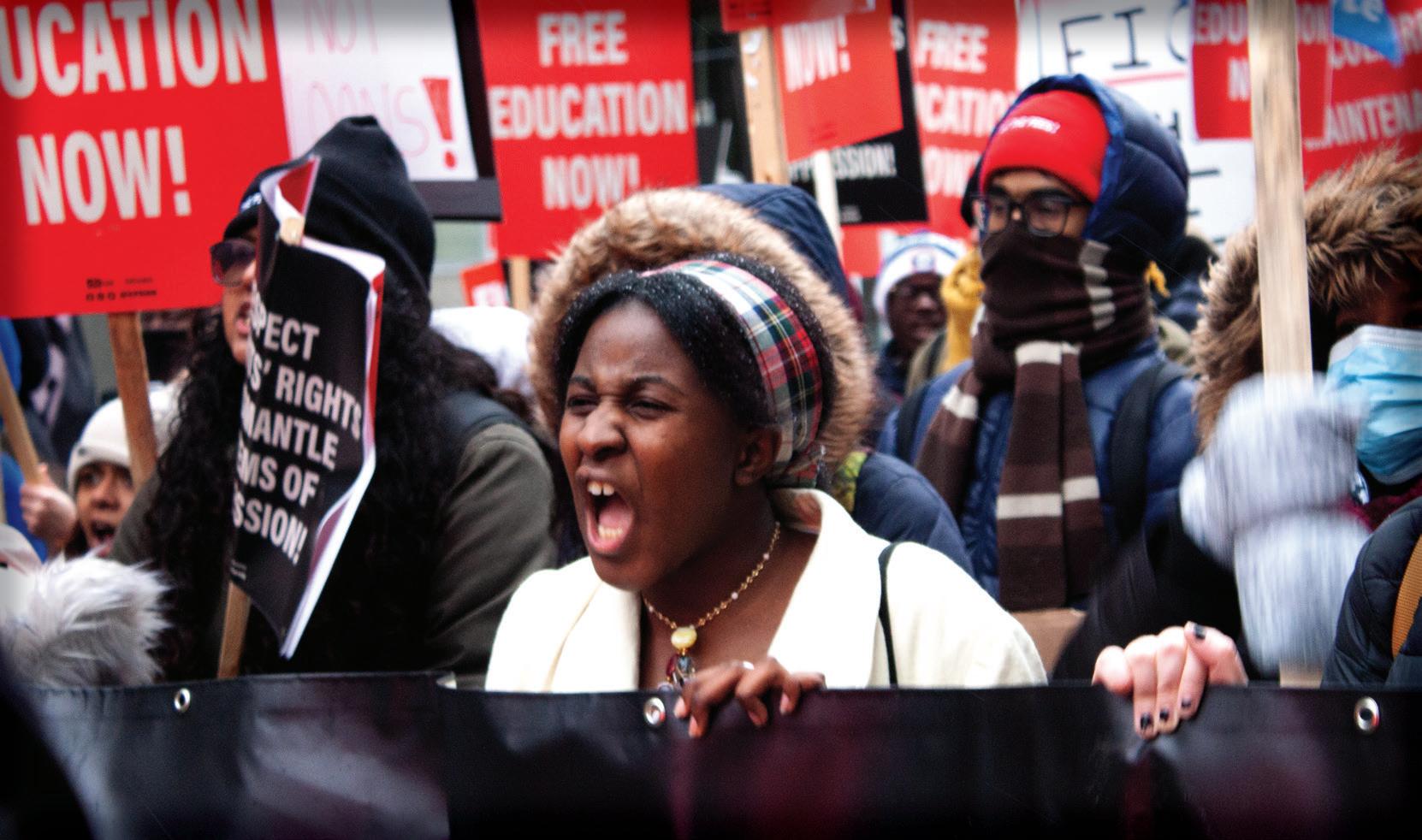

CREATED BY LIV CHUG, ETTI




 Etti Bali News Editor
Etti Bali News Editor
It has been more than 170 days since Israel’s war on Palestine after Hamas-led militants attacked Israel on Oct. 7, 2023.
The death toll in Palestine after Israel’s offensives has reportedly crossed 30,000, while the number of injured has surpassed 71,000. An Oxfam report stated an average of 250 people are killed in a day by Israel.
Meanwhile, the death toll in Israel is reported to be 1,200, with Hamas taking about 240 hostages.
The International Court of Justice (ICJ) and the United Nations have done the bare minimum to stop Israel’s genocide.
South Africa presented its case against Israel for its war in Gaza to the ICJ on Dec. 29, 2023. The ICJ didn’t recommend an immediate cease-fire.
Moreover, Israel is threatening
to expand its ground assault into Rafah where Palestinians fleeing Gaza have sought refuge.
South Africa lodged a request with the ICJ to consider whether this move would breach the court’s provisional orders given on Jan. 26, 2024.
The ICJ declined South Africa’s request for urgent measures to safeguard Palestinians. However, it said the provisional measures must be implemented.
Tedros Adhanom Ghebreyesus, director-general of the World Health Organization, said the situation in Gaza is “hellish” and has asked Israel not to enter Rafah.
The question begging to be asked is whether Israel’s military actions go beyond the right to defence. Israel has bombed hospitals, residential areas and refugee camps.
Patients at Nasser Hospital in Khan Younis were forced to leave after Israel ordered an evacuation.
As a result, people have taken to various forms of protest, such as marches and hunger strikes.
Among them are boycotts of corporations like Coca-Cola, McDonald’s and Starbucks.
The Palestinian-led BDS Movement (Boycott, Divestment and Sanctions) is also helping circulate information about what brands to boycott. BDS was formed in 2005 to “end international support for Israel’s oppression of Palestinians.”
People are also sharing BDS updates on brands that are sending financial support or vocally supporting Israel. Paramount Global pledged its support to Israel and the Jewish community. The Walt Disney Company donated US$2 million to organizations providing humanitarian aid in Israel.
It is not wrong to send relief or show support.
What is wrong is condemning one and staying mum on the other.
If antisemitism is real, so is Islamophobia.
The heart of anti-establishment movements is the notion of an individual versus the state.
Abu Sufiyan, a brand s trategist from Delhi, India, was to participate as a vendor at a food event, but he withdrew when he came to know that it was sponsored by Coca-Cola.
Though Coca-Cola has said it “does not fund military operations in any country,” it is being boycotted for violating international law in Atarot. It operates a plant in Atarot, a territory illegally occupied under international law by Israel in Palestine.
“With the event, Coca-Cola wanted to penetrate the dastarkhwaan (tablecloth) concept of dining with family and friends. The goal was to replace homemade beverages with Coca-Cola,” Sufiyan said.
“I couldn’t align myself with their positioning in the war, so I withdrew,” abandoning his C$1,630 investment in the show, he said.
Sufiyan has a social media reach of 200,000 followers. His past events have generated footfalls of more than 10,000 visitors.
“They could have become potential early adopters of Coca-Cola,” he said.
Reports on consumer data, especially from the Middle East, have shown people increasingly prefer home-grown brands over these companies.
Chris Kempczinski, the CEO of McDonald’s, admitted in a post on LinkedIn that markets in the Middle East and some outside the region were experiencing a “meaningful business impact.”
He said the “associated misinformation” was “disheartening and ill-founded.”
McDonald’s hasn’t issued any statement in favour of Israel.
Starbucks sued its union, Starbucks Workers United, on Oct. 20, 2023, after the union tweeted in support of Palestine. The company said it condemned Hamas and disagreed with the union’s views.
In the lawsuit, Starbucks has reportedly mentioned it received more than 1,000 complaints after the union’s tweet.
Soon, calls to boycott Starbucks
flooded social networks.
The company stated on Dec. 29, 2023, that it has no political agenda and does “not fund any government or military operations anywhere.”
Reports show these calls to boycott coupled with a slow recovery in China led to Starbucks’s shares plummeting by 8.96 per cent in December, amounting to roughly US$11 billion or C$14.8 billion.
Historically speaking boycotts have worked by uniting people and ushering in reforms.
One of the most prominent faces of India’s fight for independence against the British Raj, Mohandas Karamchand Gandhi started the Swadeshi (Swa: Self, Deshi: Country) movement on Aug. 7, 1905. The nationwide movement called for a boycott of British-made goods, especially cotton.
Gandhi urged people to spin their cotton.
This led to a decrease in British imports and to the implementation of the Indian Councils Act of 1909, also known as Morley-Minto Reforms, allowing an increase in Indian participation in the legislature.
The efficacy of boycotts coupled with other forms of protest are known to make an impact. Sure, there can be a few hits and misses, but it does pave the way for the world to take cognizance.

 Zoe Pierson Editor-in-Chief
Zoe Pierson Editor-in-Chief
poll of 3,550 Canadian adults conducted on March 24, reveals that Canadians are largely opposed to the re-election of Justin Trudeau.
“Fifteen per cent of Canadian adults believe Justin Trudeau and the Liberals deserve to be re-elected, unchanged from last month while those who think it’s time for a change and feel there’s an acceptable alternative is at 52 per cent,” Abacus reported.
For many Canadians, Trudeau taking a walk in the snow may be at the top of their wish list.
reported that provincial taxes for individuals jumped to $341,473 from $309,157 between 2021 and 2022, mimicking the previous years which all had a similar sharp increase.
Canadians are being taxed on a level that many cannot keep up with.
It is not just the increase in taxes that is causing political pushback for Trudeau, it is also the lack of leadership and strength when it comes to the government.

Canadians are being taxed on a level that many cannot keep up with.
Justin Trudeau, in an interview with CBC, said he thinks about quitting his position as prime minister all the time.
If I told my manager that I thought about quitting my serving job, I wouldn’t be put on the schedule anymore.
I wouldn’t have a job.
The leader of our country should be proud and secure in his position.
An unsure prime minister is a weak prime minister.
An Abacus study, based on a
Justin Trudeau may be more like his father than we previously thought.
He may follow in the footsteps of his father Pierre and take a step back from leadership when faced with the harsh pushback from Canadians regarding their living and economic conditions.
It seems as though the tax for living in Canada only continues to grow.
The Organization for Economic Co-operation and Development (OECD) tax review of Canada,
The Abacus poll found most Canadians are both exhausted and concerned about the ongoing state of the Canadian government and their efforts to support Canadians.
I agree. I am exhausted.
“The mood of the country remains quite negative, with only one in four Canadians believing that the country is headed in the right direction,” the poll stated.
“This consistent sentiment is mirrored in the federal government’s approval ratings, with 59 per cent disapproving of the job performance of the government
led by Justin Trudeau,” Abacus reported.
As someone hoping to start a family and build a home in Canada, it scares me to see how little my fellow Canadians trust their government and their prime minister.
I believe Trudeau has the potential to be a great leader. He makes hard decisions and holds himself well, but falls short when it comes to listening to and working with Canadians.
“Canadians expressed concerns about its focus and effectiveness, with a majority viewing the government as distracted, focused on the wrong priorities, and closed,” Abacus reported.
No matter the party you stand with, it is clear Trudeau is losing credibility in the eyes of Canadians.
Trudeau may not be the leader the Liberal Party needs.
It is time for a change in the Liberal Party.
 Eleanor Kate Iglesia Culture Reporter
Eleanor Kate Iglesia Culture Reporter
Less than a month left until the end of this semester, and I’m still constantly trying to balance my school, work and personal life to avoid burnout.
Being a daughter, sister, full-time student, and part-time receptionist are all the causes of my burnout.
In addition to these factors of who I am, I’ve always been self-reliant growing up.
I rarely asked for help from anyone and learned through watching and listening.
However, I never anticipated being independent would cause me to feel so mentally, physically and emotionally exhausted.
The World Health Organization
(WHO) characterizes burnout as an occupational phenomenon and not classified as a medical condition. When a workplace doesn’t successfully manage or help an individual balance their stress, the person can experience feeling worn out.
WHO describes burnout as feelings of energy shortage or exhaustion, a mental distance or feelings of negativism or cynicism related to one’s job and low professional efficacy.
The organization focuses on burnout within the workplace. But working within an automotive business doesn’t overburden me
with stress. It is more so having to work to keep up with my finances. The stress comes from working long hours to pay my bills.
Then, at home, I am the only daughter and middle child. With my mother being the only other female in the house, more than 85 per cent of the chores are assigned to me.
While my brothers are relaxing at the end of the day, I am stuck staying up late in the kitchen washing dishes, making lunches and figuring out the next best day to do laundry, clean the house or bathe the dogs.
According to a national survey
from BioMed Central Public Health, 95 per cent of Canadian post-secondary students using campus mental health services reported being overwhelmed and exhausted, and 84 per cent reported anxiety. My school environment is different compared to my home and workplace. Some professors and peers create a relaxed atmosphere. But that does not mean the workload gets any easier.
Sometimes, there aren’t enough hours within a day to complete the assignments I want to finish.
I’ve learned that many stressors

contribute to my burnout, and I am still learning how to cope with it.
Dr. Gillian Strudwick, a mental health nurse and chief clinical informatics officer at the Centre for Addiction and Mental Health, said recognizing what one can and can’t control can help manage burnout.
She said some factors from school, work and organizations contribute heavily to an individual’s burnout and are things people can not control.
“The part that you can are things to an extent that you have the knowledge and ability and finances and all that,” Strudwick said. “For example, self-care, awareness of burnout and self-assessment.”
Once someone realizes they are burned out, the next step is to figure out the stressors and then set realistic goals, she said.
Strudwick taught me that burnout is something I can manage by myself by understanding how I feel and figuring out how to and if I can address my stressors.
I hope to cope with burnout by creating healthy habits like planning my tasks ahead of time and spending time alone to reflect on myself.
An artist is giving a wooden pole outside a café on Harbord Street an artistic makeover using Lego toy pieces.
Martin Reis is a trained photographer and artist. Born in Germany, Reis immigrated to Canada at the age of 13. Now 60, he’s creating tangible and performance artworks in the city. It is his way of creating community spaces. Reis has named this pole near Clinton Street the Tour de Lego, or Lego Tower.
“It’s like the Tour Eiffel, the French tower. I always like to bring in a bit of French culture in English Canada. My father is French, my mom’s German,” he said.
“I actually do a fair bit of that in my other work as a performance artist.
“I deliver telegrams in French. It sounds more fun this way. If I call it like Lego Tower, that’s a little boring,” Reis said.
What started with just four to five layers on Jan. 3 has grown into a tower of more than seven feet, exhibiting over 4,000 to 5,000 pieces. He has spent more than $200 buying Lego pieces, while some are donations.
He worked with different materials like leaves and telegrams, but he chose Lego toys for this instal-
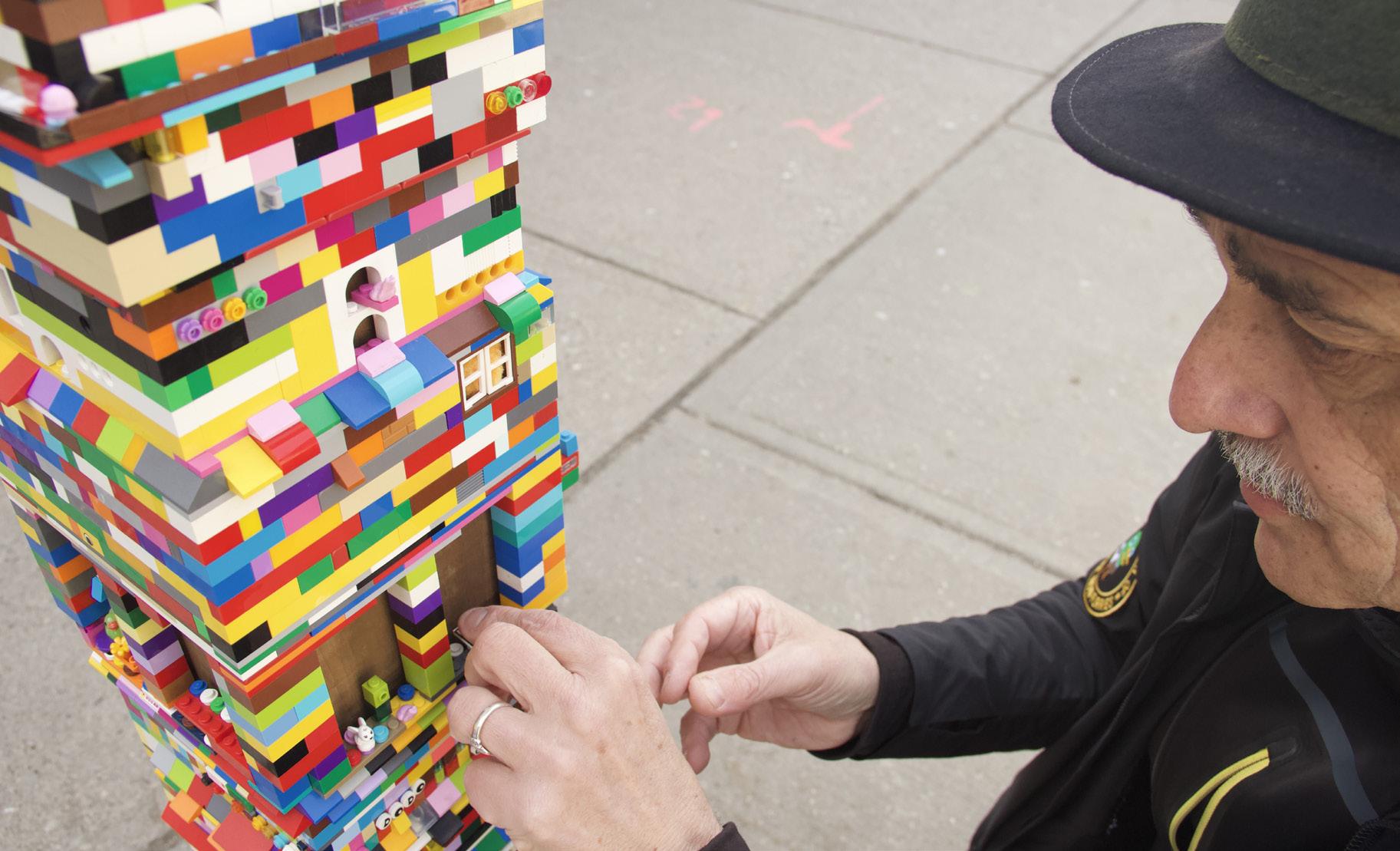
lation as they appeal on various levels, he said.
“Lego was one of the first things I did when I worked with other street artists. I’ve always been inspired by other artists around the world who use Lego in public settings,” Reis said. “For this one, given how many schools there are in the neighbourhood and how many kids enjoy it, I thought Lego would be the perfect choice.”
Working towards building com-
munity art, he said Lego provided him with the sustainability needed to survive outdoors.
“Lego is great because it’s universal. You don’t have to worry about the environment doing anything to it,” Reis said. “It’s colourful. It’s joyful. It’s just a perfect community art material.”
He is happier putting pieces out there for people to interact with and holds no illusions as to whose art it is.
“It’s all about bringing ideas out there and then letting other people take over. I don’t have any ownership over this piece,” Reis said. “Once I put it out in the community, it’s the community’s piece.
“It doesn’t need to be all my work. It needs to be a collaboration, a conversation between the city and myself,” he said.
For him, art is ageless. He said toddlers to 80-year-olds added pieces to the tower.
“Every child is born an artist,” said Reis, a former freelance photographer with Now magazine for 10 years and has also been documenting street art.
He said he doesn’t have the permit to do it, and even though no one has complained about the Lego Tower, he’s worried somebody would and the city would take it away,
“I am a little nervous that somebody will complain. I don’t have a permit to do this. When I think of a permit, I think of children,” Reis said.
“The children are my permit. Because it makes them happy.”
His past works include The Trees Have Spoken, an art installation created in December 2023 using fallen leaves at the Western Island of Ontario Place.
Reis played the role of a soccer referee handing out red cards to traffic rule violators in a performance art piece in July 2023. The art promoted pedestrian safety at intersections like Bathurst and Richmond Streets.
He now works for a music ensemble called Tafelmusik and hopes he can take up creating art full-time.
“I run music concerts to pay the bills, but maybe one day I can do this professionally all the time,” he said.
Holi is a festival of colours that marks the arrival of spring, celebrated in India.
The festival is based on the legend of Holika, a tale where good is victorious over evil.
The festival is celebrated in two parts. The first was a religious bonfire, usually called Holika Dahan, which stands for the end of all things evil.
On the day after, people continue the festival by smearing colour on each other.
Toronto celebrated its version of the festival with Toronto Fuzion Holi Season 2, held at 100 Steeles Ave. East, Brampton, on March 23, 2024.
The event organized by Bandish Banddits was attended by more than 4,000 people and became the largest Holi celebration in Canada.
Devang Gohil, one of the organizers, said 4,000 to 6,000 people attended the event.
“We have good music, good food and good lighting to keep the
energy levels up,” he said.
Gohil said despite the large turnout, organizers ensured a smooth process, maintaining order and efficiency throughout the event.
“In the spirit of Holi, all the colours utilized were organic, reflecting a commitment to sustainability and environmental con-
sciousness,” said Banddits in its Instagram post.
Volunteer Jeet Patel said people of all ages, ranging from toddlers to seniors as old as 60 and older, actively participated in the event and seemed to derive enjoyment from the experience.
“Ajay Sarkaniya, who attended the Holi event with his family and
friends, said the event was well-organized.”
“The parking could’ve been managed better,” he said.
He said that despite the parking lot being filled, numerous people were still attempting to enter and they had to park elsewhere and walk to the venue. “[T]he event itself was not overcrowded at all,”

Sarkaniya said.
“One of many volunteers at the event, Kinnari Rushiraj Shah said, ‘With us working tirelessly, we managed to keep the crowd grounded and keep the event going.’ It is shocking people are waiting outside in the cold to get in [the complex],” he said.
Sahir Singh, who attended the event with two other friends, described the event as fantastic, memorable and energetic.
Bandish Banddits’ Holi event showcased the vibrancy of Indian culture while providing a platform for community engagement and connection. In addition to the traditional colour play, the event featured authentic cuisine and traditional garments and accessories at stalls, which added to the cultural experience.
“We have been doing Holi events [for] about six to seven years with smaller scale and now it got bigger,” Gohil said.
“We will have more festive events moving ahead, so you don’t miss home,” he said.
The Royal Ontario Museum celebrated its 110th anniversary on March 23 and 24, with free entries from 10 a.m. to 5:30 p.m.
As wait times were expected, people lined up in front of Ontario’s renowned cultural and educational institution before 10 a.m.
On both days, the museum reached its full capacity slightly before 4 p.m., prompting ROM volunteers to make announcements at the entrance, advising visitors to turn back as no further entries were allowed.
Alex Howard, one of the visitors, who came to ROM with his family said the experience was nice but it was too crowded for him to see all the artifacts.“I will come again once it is not this crowded so that I can read about the art,” Howard said.
In a news release before the weekend, ROM said all guests should enter through the Weston Entrance along Queen’s Park.
The lines were separated into two halves and the ROM volunteers guided the crowd patiently into the museum.

Included in the anniversary weekend was the free admission to the special exhibitions Death: Life’s Greatest Mystery and Wildlife Photographer of the Year. The exhibition about death took visitors on a journey of how different cultures and traditions help the community process a death.
Addia Nasir, a visitor, who spent hours at the Death: Life’s Greatest Mystery exhibition, said she saw different elements of death for cultures across the globe. “I thought it was really interesting to see all the different things that were just put in front of us and then to compare it to like my own knowledge, even
like the different, I’m Muslim,” Nasir said. “So looking at how the Jewish, how Hindus, how everyone sees death differently, I think that’s really interesting and also comparisons of it.”
ROM had several outstanding sculptures and dinosaur fossils on display for visitors who were interested in science.
The skeleton of an Ankylosaurus, Zuul crurivastator, a horned and armoured dinosaur with a sledgehammer-like tail was also available for visitors to see until Sunday.
Matthew Araneta, an Engineering Student at Toronto Metropolitan University, said that he enjoyed the Death exhibition the most.
“And I feel like this exhibit does a really good job of kind of exploring death not just scientifically, but religiously and Philosophically, and it kind of questions like where do you see yourself after you die or what may happen to you?” Araneta said. “And it’s not just something that you explore from the past but something that you kind of reflect upon for the future.”
The Royal Ontario Museum was created by the Ontario Legis-
lature in 1912 after the ROM Act was signed. It officially opened its doors to the public for the first time on March 19, 1914.
In the beginning, the museum consisted of five different museums affiliated with the University of Toronto, but they were combined into one in 1955 and separated from the university in 1968, according to ROM.
Gilles Huot, a ROM volunteer, said it is always wonderful to see, thousands and thousands of people come to the museum and that’s why he was there. Huot said he liked teaching visitors about the artifacts they could see and enjoy as he guided them at the entrance.
“Well, here we have quite a few galleries that are very important and almost unique in the world,” he said. “For example, our gallery of Chinese artifacts is one of the best in the world. We have a gallery called Dawn of Life, which is life before the dinosaurs, from zero to the dinosaurs, and it’s probably unique in the world.”
For those who missed the chance, free entries at ROM are available every third Tuesday of the month.
Two artists from different corners of the world connected online in 2019 during the COVID-19 pandemic and planted seeds of collaboration.
The product of this collaboration was Knotwork, on display at Craft Ontario from March 9 to April 21.
Montreal-based Sandy Lamb and Stockholm-based Miriam Parkman may not share the same time zone, but their creations are an amalgamation of both their styles.
Lamb’s work is focused on weft-faced tapestry weaving. He said in an email to Humber News that art is a mode of expression, a way of living and a habit for him. Making it can be invigorating and exhausting.
“By establishing a dialogue with art, either through expression or appreciation, I think everyone can become more deeply connected with themself and others,” he said.
“The time spent during the lockdowns definitely spurred a lot of creative energy and motivation to finally mount an exhibition and doing a show with Miriam [Parkman] felt like a good and nat-

ural direction to go.”
Parkman uses a traditional Swedish hand-knotted rug technique in her pieces.
She graduated from the Stockholm-based Handarbetets Vänner school, which translates to Friends of Handicraft, in 2016 after three years of weaving and needlework studies.
“My relationship to art is very much formed by this: history, textiles, tradition, revaluing what someone else threw/gave away,” Parkman said in an email to Humber News.
She said she and Lamb chatted and connected over many topics,
from technique, yarn qualities, dating and food. The traces of this can be seen in their pieces.
Knotwork came to life because of the support from the staff of Craft Ontario and they were a pleasure to work with, Lamb said.
Craft Ontario, based in Toronto, supports craft artists by showing them how to develop their careers and profit from it.
It also helps to promote their work through exhibitions, retail, print and online publications.
Scott Coish, a Craft Ontario sales and marketing associate, said Lamb and Parkman met for the first time in Toronto at the Knot-
work exhibition.
“One of them works mostly in a traditional technique from where she’s from called rya, where you’re working on a loom and your hand knotting pieces through to kind of give that the rug or textured, carpet look, whereas the other one works more primarily on flat looms, a flat tapestry,” Coish said.
Janna Heimstra, the executive director at Craft Ontario, said Lamb and Parkman applied for the exhibit with Craft Ontario in 2023 and were accepted once the curator, Robyn Wilcox, who works with the DesignTO Festival primarily, organized and set every-
thing in motion.
“This piece here is actually based on a photo of her grandmother and it’s her grandmother dyeing yarn which is a practice that Miriam does as well,” she said.
“So when you look at her pieces, she’s the one who’s actually applied the colour to the fibres and decided how that’s all going to come together.”
Heimstra said the artists were inspired by and experimented with each other’s techniques.
“Some of these knotwork pieces are Sandy’s [Lamb’s] and what he’s learned from Miriam [Parkman] and vice versa,” she said.
Heimstra said the exhibit opened on Saturday, March 9, and many textile fans showed up to meet the artists, some of them hardcore fans of Lamb’s work online.
“Without abandoning our individual impulses, we allowed ourselves to be influenced by each other during the course of the collaboration,” Lamb and Parkman said in a joint statement on Craft Ontario’s website.
“The works that make up this exhibition trace the trajectory of our cross-pollination, the knotting together of two artists from different places.”
Fashion is more than just fabric and trends. It’s a reflection of who we are, where we come from, and how we navigate the world.
This is evident in the vibrant tapestry woven by the young fashion management students at Humber Lakeshore campus on March 25.
Program Coordinator of the Bachelor of Commerce, Francesca D’Angelo’s fashion students’ projects perfectly capture this spirit.
“They’ve been given demographics specific to Humber College,” D’Angelo said. “So it’s pairing up the demographic with the particular trends that we foresee.
“I haven’t given it an overarching theme so each group will have to present their own unique theme,” he said.
D’Angelo said the students used skills gained from a previous project about Lunar guides to create customer profiles and mood boards.
“We’re continuing to build on those skills with this assignment,” D’Angelo said. “I made them work in pairs on their designated demographic that they’ve been given.
“So they can now go into a job interview and say they know how to predict trends that will be coming in the future because they’ve gained these skills through their learning,”

D’Angelo said.
Technology also played a role as the student designers said they used social media apps like Instagram, Pinterest and X to gauge trends and incorporate sustainable fabrics.
D’Angelo said this project aimed to equip students with the essential skills they needed to succeed in fashion management, including presentation skills, portfolio building, and styling abilities.
Jensi Patel and Tearislee Thomas, two fashion management students, said their collection reflects the trends their research has predicted.
Patel and Thomas said their research predicts trends such as burgundy, elemental blue, and versatile dressing for various activities.
“Based on our mood board, you can see this woman. She’s a black, catholic woman who is 23 years old,” Thomas said. “So we wanted to make sure that when we were doing trend predictions, we had stuff that wasn’t too provocative and things that you can spin into everyday wear.”
Thomas and her partner said they aim to blend art, culture, and technology by incorporating traditional prints, modesty, and versatile, sustainable fabrics.
“I guess the biggest inspiration for our mood board is probably a new spin on Sunday best dressing,” Thomas said.
Transitioning from this ethos, Jensi Patel said she wanted to fur-
ther elaborate on their vision of blending modesty with current trends, emphasizing a springsummer vibe.
“We tried to incorporate a futuristic summer vibe for our girl,” Thomas’ partner Jensi Patel said.
Challenges such as finding the right trends that align with the target customer’s budget and cultural background were also highlighted by many of the students, showcasing the complexity of creating fashion collections that resonate with specific demographics.
Julian Samadhin and Rhys Wylie said they faced a few challenges while coming up with the right character persona.
“It was really difficult trying to
find aspects of a completely different person’s life online without knowing the person at all,” Wylie said.
“I would say timing in terms of what I wanted to incorporate was a challenge, I wish I would have added more details. We described our ideal customers as if they were shopping at stores, but I feel like there is more personality to them,” Samadhin said.
Valentina Saki and Erica Backman said that affordability, diversity and hyper-femininity were two things they kept in mind while creating their mood board.
Erica Backman said their customer profile was a 21-year-old student with a passion for thrift shopping.”She likes watching movies, rom-coms especially,” Backman said. “She listens to Latin-American and pop music, she likes to read romantic novels and she likes jewelry.”
Capturing the essence of their target demographic, Valentina Saki, said that slingback heels, a typically feminine look, are a popular style that’s hitting the runways.
“Hyper-femininity is something that you can put in anything, that can embody art, as well as sustainability. Being able to reuse and recycle things like upcycling as well, that’s part of art I think,” Saki said.
Bereaved Families of Ontario-Toronto (BFO Toronto) and Toronto People With AIDS(PWA) curated a space where the Black, African, and Caribbean diaspora could express their grief through storytelling on Tuesday.
Patrick de Belen and Kareem Bennett, both spoken word poets and Toronto residents, facilitated “Healing Narratives: Storytelling for Grief” at Toronto PWA on Queen Street East.
Bennett and de Belen prompted attendees to think about and discuss their grief through written and verbal exercises.
“Storytelling can be used as a form of remembering, memorializing, navigating, and searching,” de Belen said. “It’s a vulnerable art form that brings people together in a way that people get to see the parts of you that aren’t usually talked about.”
Growing up in North York when mental health services were limited, de Belen said he was told to express how he felt by putting pen to paper. After years of writing and per-

forming spoken word poetry, he said he was struck by tragedy after the death of his younger brother in 2021.
Through this loss, de Belen said he made it his mission to aid others dealing with grief by becoming the BFO’s Resident Storyteller and grief support worker.
Co-facilitator Kareem Bennett said he had a similar story of growing up in Toronto’s west end, and how the art of storytelling kept him out of harm’s way.
Growing up in the Jane Street and Finch Avenue community, Bennett said gun violence was prevalent in
his childhood, which prompted him to find things to keep him occupied indoors.
Since discovering his love for the arts in high school, Bennett said he became a spoken-word artist, helping him voice thoughts often difficult to explain.
“Growing up, poetry was something that helped me find a voice,” Bennett said. “It helped me develop the vulnerability to articulate my emotions.”
Sarah Garcia-Heller, executive director at BFO, discussed the importance of spaces like BFO and these workshops for the commu-
nity.
“Events like these are necessary because it’s what we do,” Gracia-Heller said. “It’s a beautiful example of peer support, how we can come together in community, how we can share in our grief, and how we can normalize it and know that it’s okay to talk about.”
Throughout the event, attendees completed a series of exercises where they used their words, senses, and experiences to explain what grief is to them.
Participants voiced grievances about loss, housing and job insecurity, and missing their home countries.
“As Black people, we do process grief in different ways,” Bennett said. “Some can be a bit detrimental to both ourselves and our culture.”
“Grief is an ongoing thing, it doesn’t ever go away, it sits with you,” Garcia-Heller said. “Having the opportunity to connect with others and know that you can share grief is beautiful. It’s very healing.”
Garcia-Heller said the importance of free community spaces like this is necessary for many who do
not have the means to therapy, especially newcomers to Canada.
“A large part of why BFO started is to be a safe space to talk about grief and to normalize it,” Garcia-Heller said. “It’s important to become emotionally literate.”
Nicole Thompson, who works with the Black Coalition for AIDS Prevention, was brought to tears as she read a letter she wrote to her grandmother.
“Today, I found out I was grieving someone who I thought I had already grieved,” Thompson said. “This opened my eyes to see that I need to get help so that I could fully grieve the loss.”
Grief is not a linear experience, said Garica-Heller, with many not realizing that while they may have moved past the initial event, the feelings often get buried. Through storytelling, grief becomes something not to be ignored but embraced and discussed, said de Belen.
“We’re here to let people know that it’s normal,” Garcia-Heller said. “You shouldn’t feel weird or alienated for grieving.”

At a young age, my uncle Sandy Poce always had the passion to take on one of the sports he always cherished.
Football always meant much more for my uncle. It would lead to his desire to pick up shoulder pads and a helmet and make a name for himself on the field.
“I started playing when I was 16 as a junior, in Grade 11 at Westview Centennial Secondary School” on Oakdale Road in North York, Poce said.
Coming off of a semi-final appearance in his senior year, my uncle would be key to his high school team’s success in his final year as he delivered for them on both sides of the ball.
“In Grade 13, I played both wide receiver and also defensive back,” he said.
His play would not go unnoticed as it would help his team win the North York Football Championship. He was selected to play in the Metro Toronto Bowl, an all-star game for all the top players from Metro Toronto high schools.
“There was no better feeling. In that game (North York Football Championship), I scored a 40-yard touchdown, intercepted two passes, caught about five punts and kickoffs and ran them back,” Poce said.
“It was the best game I ever played,” he said.

After those achievements, my uncle deservingly earned a scholarship in September 1973 to continue his football career with Humber College.
My uncle would get to keep his two starting positions at Humber playing wide receiver and free safety. He would look to make an impression right away.
“We had recruited some really good players and quite a few from my high school team, so we thought we were good,” Poce said. “We won our first game. I scored a few touchdowns, made a number of catches, and we were off to the races,” he said.
Humber started its season 1-and-4, but my uncle always gave his best on the field, no matter the outcome.
“We started off having a great team,” Poce said. “I would have to say that I tried to pick up the slack and was one of the better players, but injuries really hurt us.”
The bad luck would not go away.
Humber’s football season ended early because injuries pushed the team to the breaking point.
Although Humber was only able to play half a season, my uncle was able to show off his skills, holding plenty of records for his play.
“I had records at Humber for
number of catches, number of yards, punt return yards, kickoff return yards and interceptions,” he said.
His valiant play would end up getting him selected to the Ontario Colleges Athletic Association AllStar team as a defensive and offensive player. This record still holds up to this day.
“Being an all-star meant a lot considering I had won it and only played half a season and then had coaches from other colleges calling me to come play for their schools after Humber folded,” Poce said.
“After that, I was also scouted by Greg Barton, who was scouting
for the (Toronto) Argos and asked to come for a tryout but decided against it,” he said.
The All-Star team would be my uncle’s last experience playing football. It was also the last season for Humber College, which ended its program that year.
My uncle would also finish his football career. “Mostly size” was a key reason he decided not to continue.
It has been 51 years since Humber College has had the opportunity to throw a touchdown. My uncle said he would love to see a football program return.
“It would be nice, but I don’t think it will ever happen,” Poce said.
Brian Lepp, Humber’s head of athletic communications, said he would love to return a football team to the wide variety of sports at Humber, but the cost might be an issue.
“Of course, I would want Humber to have a football team obviously because it’s my favourite sport,” Lepp said.
“The issue with football is that it’s too expensive, insurance-wise. Equipment-wise, you’re looking at hundreds of thousands of dollars,” he said.
Although Humber is not likely to acquire a football team any time soon, my uncle will always be in the books of the college’s history and a record that he holds aside that makes it even better.
The Humber Hawks athletic season has ended and Associate Athletic Director Michael Kopinak reflected on the year that was.
He described the season as a “good news, bad news” kind of year for the school’s teams this season.
“There were a lot of seconds, [we] started out slow, [but] we really turned it up late in the second semester, and really what I would say is saved our year,” Kopinak told Humber News.
The Hawks saw more mixed results this athletic season than it’s become accustomed to, as they almost matched the number of golds they won with an equal amount of silver medals.
Humber won 10 OCAA gold medals across all sports this athletic season but also came up short by bringing home silver nine times.
While expectations are always high for the Humber Hawks, Sports Information and Marketing Coordinator, Brian Lepp, told Humber News that the results this year were what he expected. He said that some may view this

year as a bad year, but he is not one of those people.
“I think all of our teams did what we expected they would,” Lepp said.
“Realistically I don’t think it was a bad year,” he said.
Along with the more than 20 medals Humber won at the provincial level, Lepp said Humber accomplished other feats, as well, such as having 11 All-Canadian team members and extending their streak of winning a national championship to 20 years.
And where they came up short, Lepp said he hopes these teams use that as motivation to improve going forward as they prepare for next season.
Kopinak shared Lepp’s hopes and said this summer the teams that finished second in particular should use that as fuel in preparation for the upcoming season.
“All those seconds, I’d be posting those up in the team rooms, in the locker rooms and let’s have those conversations of how to get over the hump,” Kopinak said.
One of those teams that has the motivation to improve on their shortcomings is one of the bigger success stories for Humber this year, the OCAA champion men’s basketball team.
Omar Miles, head coach of the men’s basketball team, said his team coming up short in the CCAA semifinals and having to settle for a national bronze medal has created a sense of hunger in his team to improve.
“I know that my guys are naturally hungry,” Miles said.
“We are going to earn it next year if we have the fortune of getting back to that stage,” he said.
Miles said his roster is young, as only two players on the team this past season were on the roster that won a national championship a few years ago.
He said the experience that his young roster gained from this year is more important than anything he or his staff could coach them on.
He also said how important losing can be to learn and grow along with the experience they gained and the hunger they have to improve.
“You don’t learn anything from winning all the time,” Miles said.
“When you win you don’t [ask] what you could have done better, because you just have to be grateful to have gotten that far,” he said.
Kopinak said the issue of coming up just short and having too many silver medals is a good problem to have and put into context how good one of Humber’s down years is compared to other schools across the province.
“Our bad year is often some other school’s decade,” he said.
The Leafs are currently third in the Atlantic division behind the Florida Panthers and Boston Bruins, still having to clinch their spot in this year’s playoffs. And just behind the Leafs is Tampa Bay, working hard to surpass the Leafs.
Last year was the first time the Leafs made it to the second round since 2004, and fans are fearful about what this season will bring.
Fielding Phillips, a self-employed contractor and avid Leafs fan, is trying to stay optimistic about the team’s performance in playoffs.
“It’s similar to every year, the regular season has a little bit of a rough start, goaltending issues, but all in all they put a good season together and make you think good things for the playoffs,” he said.
Phillips said the outlook on the team’s future always looks difficult during the playoffs.
He said the format is a major player in how these next few weeks will shape up, which the players have been speaking of during recent interviews.

“I think from here on in our group has to be very competitive,” defenceman Morgan Rielly said in a post-game press conference Sunday.
“For us, we’re trying to ramp up into that playoff mode,” he said. Recent player injuries have had fans worrying about what the next few games will look like.
“They have enough pieces that it shouldn’t affect them that much, the importance comes down to how long are they out and if we
are chasing games to get a spot we want,” Phillips said.
Leafs forward Mitch Marner has been off the ice with a high-ankle sprain since the March 7 game against the Bruins, and the team has been 4-2-1 in his absence.
“The more injuries and illnesses and things we face, the more we’ve learned about the value of our depth,” head coach Sheldon Keefe said in a pregame press conference.
Marner is not the only injured
player, with goaltender Ilya Samsonov missing a handful of games after an undisclosed injury from Saturday’s game against the Edmonton Oilers, and forward Calle Jarnkrok out with a hand injury since March 14.
When asked in a press conference about his thoughts on the last 20 games, Keefe said he is hopeful of the team’s ability to come together and have the players continue to step up.
He gave special mention to
forwards Bobby McMann and Connor Dewar on their ability to give the team what they need and made it clear he thinks the team is trending in the right direction.
Dewar was one of the players acquired during the 2024 trade deadline, alongside Ilya Lyubushkin, Joel Edmundson and prospect Cade Webber.
“If [the team] still kept the same pieces every year, that’s why things weren’t moving so well, but there have been some big changes this year and we’ll see what they can do,” Phillips said.
The Lightning are only two points back for third place in the Atlantic as of March 28. Should they pass the Leafs, Toronto will find themselves in a wildcard spot, making their playoff hopes more questioned.
Fans like Phillips are trying to stay hopeful with 11 games remaining of the regular season, including Washington tonight.
“Every year, that first Hockey Night in Canada, I always forget what happened the year before, and then I’m reminded in the playoffs,” he said.
Canada’s men’s national team qualified for its first-ever Copa América off the backs of their new age of talent.
Les Rouges defeated a stingy Trinidad and Tobago side 2-0, with a goal from striker Cyle Larin early in the second half before a late thunderbolt from young winger Jacob Shaffelburg sealed the victory.
Interim head coach Mauro Biello chose a young squad for the game, leaving out veterans like goalkeeper Milan Borjan, defender Steven Vitoria and attacker Junior Hoilett.
Indeed, after midfielder Jonathan Osorio had to pull out of the squad due to injury, there was not a single player among the Canadians over 29.
Biello, who had been an assistant coach with the men’s national team since 2018 before taking the interim role with John Herdman’s departure to Toronto FC, said before the match that he felt a lack of hunger in the program.

This lack of hunger was felt in the CONCACAF Nations League quarter-final second leg against Jamaica, where Canada let a twogoal lead on aggregate slip in 15 minutes.
That loss knocked the men’s national team out of the Nations League. It forced them into a onegame playoff for Copa América qualification, which they would’ve received automatically as Nations League semi-finalists.
Biello said after picking the
squad he felt the newer faces had stepped up and deserved the call over the veterans, even ones like Borjan who have given decades of effort to the program.
“I think the idea behind this selection is to put the best possible squad in place to get the performance we want,” he said.
Without the old leadership, the captain’s armband was handed to FC Porto midfielder Stephen Eustaquio, who was all business leading up to the game.
“There’s no room for disappointment,” Eustaquio said in a media conference before the game.
“There’s just room for improvement, and we’re going to qualify tomorrow,” he said.
And qualify they did.
The 27-year-old captain compared the mindset heading into Saturday’s game to the attitude the team had during its 2022 World Cup qualification run.
“That’s the way we made it to the World Cup,” Eustaquio said.
“We always had that desire to be first, and I think we lacked that in the last game,” he said.
Biello said the group was ready for Trinidad and Tobago to sit back and play the way they did but was happy with his team’s perseverance to break them down.
“We knew that they were gonna close space, they were gonna sit in a low block, they were gonna make it difficult,” he said.
“What I was most proud of is that we stayed on task,” Biello said.
“In the end, we were able to break them down and score the
first one, and then get the second one to close it off,” he said.
Canada will face reigning World Cup and Copa América champions Argentina, Peru and Chile in the group stage at the Copa América in June.
The team will also travel to Rotterdam to play the Netherlands in a friendly before the tournament.
Shaffelburg said the feeling of being able to go to Copa América is “unbelievable.”
“We’re beyond excited, I think,” the Nova Scotian winger said after the game.
“I haven’t been with the team a lot, but just the feels that I’ve got from this week, we’re buzzed to be going there and it’s gonna be a lot of fun,” he said.
Larin said the group is excited to face tough competition at a big tournament like Copa América.
“We’re very excited to play against top-level teams, top-level guys, it’s only gonna make us better,” he said.
“We’re going to have to step our level up against these great players and great teams,” Larin said.
 Caleb Moody Sports Editor
Caleb Moody Sports Editor
In the offseason leading up to the 2019 MLB season, Scott Boras had seemingly reached the peak of his career.
He had just secured two massive contacts for two of his biggest clients, Manny Machado and Bryce Harper.
Boras secured Machado a 10-year contract with the San Diego Padres worth $300 million and Harper a 13-year contract worth $330 million with the Philadelphia Phillies.
Boras played the waiting game and secured $630 million for just two clients.
Fast forward five years later when Boras seemed to try the same approach again with his big-

name free agents and he came up flat, potentially leaving millions on the table for his clients.
Former Toronto Blue Jays third baseman Matt Chapman and former San Diego Padres starting pitcher Blake Snell turned down longer-term nine-figure contracts as they sought even bigger deals.
Then this month Chapman and Snell agreed to short-term deals with the San Francisco Giants, worth $54 million and $66 million respectively. Both contracts are a far cry away from the longterm guaranteed money Boras had touted for them.
Although those two were the most noticeable clients of his to
come up short on their desired contracts, they weren’t his only clients receiving lower returns.
Former N.L. MVP Cody Bellinger failed to have his desired long-term contract offer met and reigning World Series champion starting pitcher Jordan Montgomery signed only a one-year contract on March 26.
Boras has played the waiting game and lost at every corner this time.
And the deck might have been stacked against him from the beginning.
In recent years, baseball has shifted to a more analytic approach.
And using Chapman and Snell as examples, despite the accolades they’ve both accumulated in their careers, both have noticeable flaws that would cause teams to question the valuations Boras had for them to start the offseason.
Chapman is a great defender and has solid power, but he has issues making consistent contact, as he ranked in the lowest 16th percentile in strikeout rate and the lowest 18th percentile in whiff rate, according to Baseball Savant.
And Snell, although winning his second Cy Young award, has his flaws with issuing walks, as he ranked in the lowest fourth percentile in 2023.
Player performance aside, this offseason brought forth some challenges in team finances.
Some big market teams, such as the Boston Red Sox, opted to focus on shedding payroll to avoid the penalties of crossing the luxury tax threshold.
Others faced their broadcasting revenues being in jeopardy, as Bally Sports, the broadcasting partner for nearly half of the league, faces a grim financial future.
The teams hit the hardest by this were two teams with postseason aspirations this season, the Minnesota Twins and the San Diego Padres.
While they would traditionally be in a competitive position to spend in free agency, the lack of television revenues saw teams like Minnesota and San Diego shed payroll rather than add.
This meant there were less competitive teams to drive up the price for Boras’ big-name clients and start bidding wars between each other.
Boras was set in his old ways this offseason and it’s cost his clients millions.
The league has changed and for the sake of its players, it’s time for baseball’s biggest agent to adapt.


